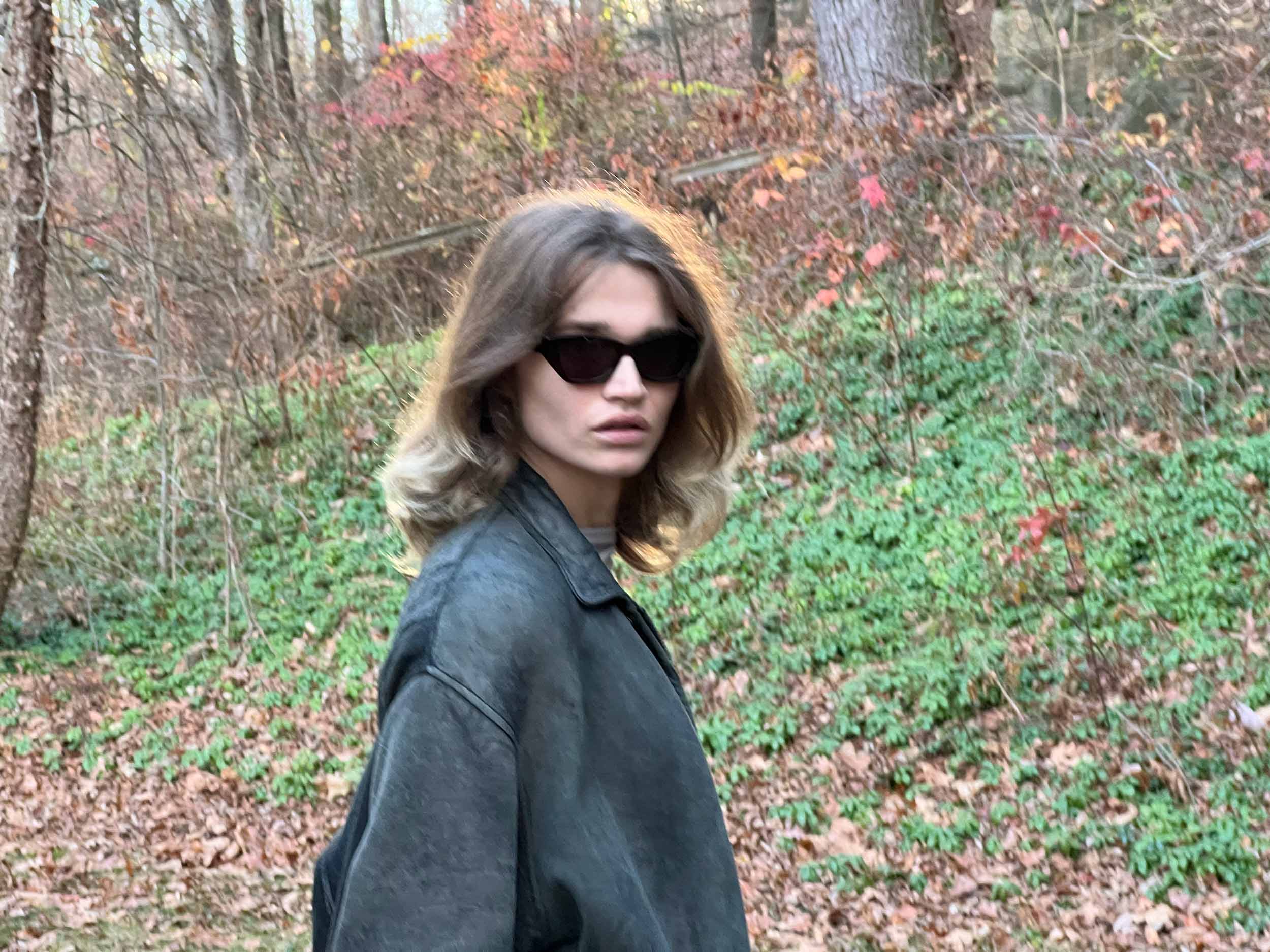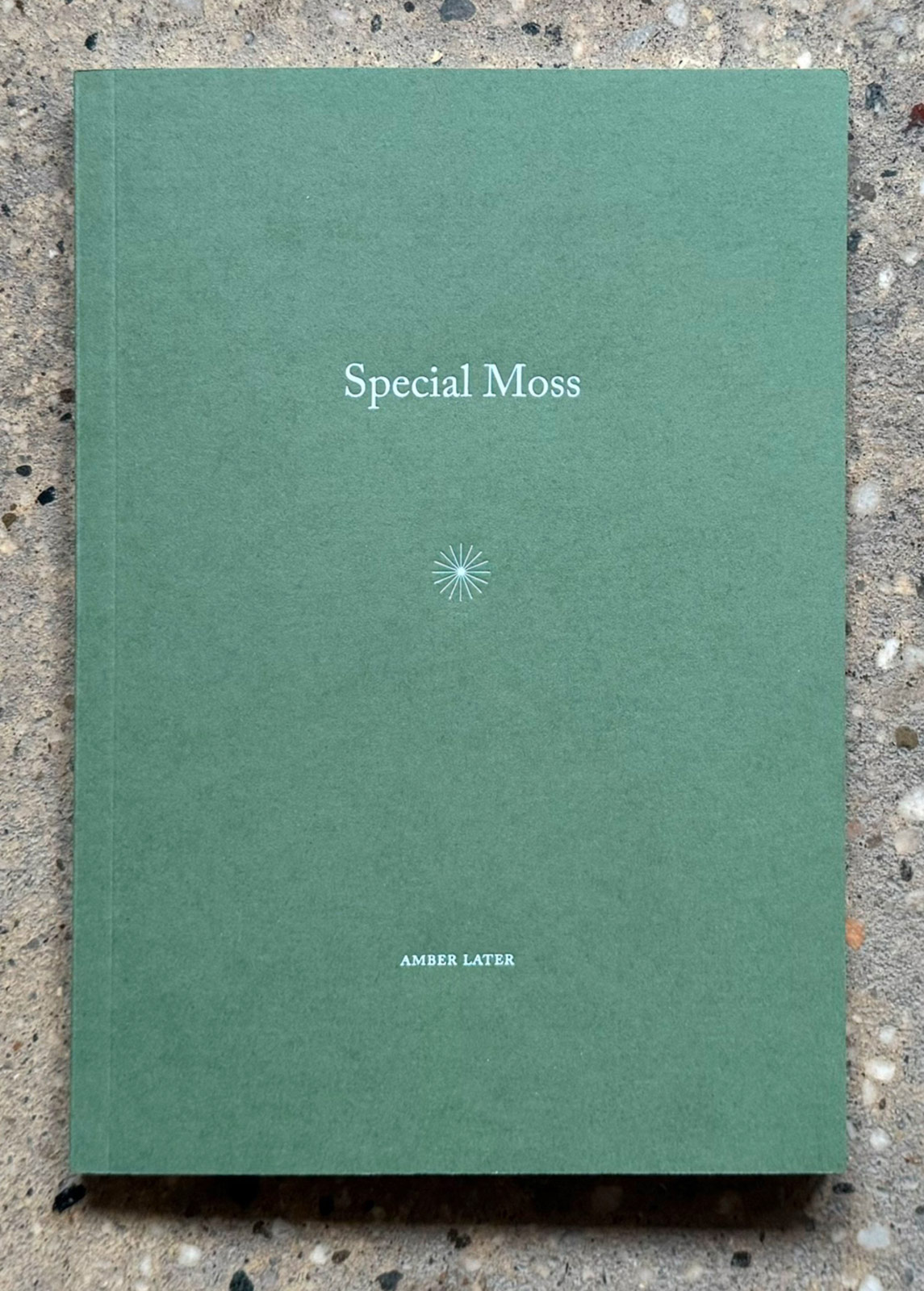The New York-based writer’s debut collection spans four centuries while traversing mysterious landscapes
She was blasting toward the horizon, surpassing 210 miles per hour over the Southwest’s desert dust. The world shuddered. “The light that she saw on the horizon was bright white, but then it switched, flickered, and turned black.” Or was it both at once?
This slipstream tale of Daphne, a star race-car driver, opens Amber Later’s debut collection, Special Moss, published by Roadkill Editions this winter. For Later’s characters, perception, self, and reality are eternally in flux—irreconcilable yet true nonetheless. A man keeps showing friends a photo he’s taken of a stick-figure drawing, asserting it looks like him, infuriating his boyfriend. After a man is punished by being tied to a tree and left to the elements, his lover begs he does the same to her so she can experience what he has; when she is found bound and alone by an aristocrat, she is all but forced into another life. Glowing moss saves a sick brother—until it doesn’t.
Comprising five stories—written from 2021 to ’23—as well as a suite of new poems, Special Moss evokes the cozy familiarity of alienation. It is tensile with humor and wonder. The book’s elements conjure a warped-mirror recognition which soon, gleefully, shatters. Maybe these shards are realer—fragments of life that narrative attempts to unify. That is, fiction. Later’s prose and poetry at once articulate and mystify being human in a world of strange others and other species, in turn making us, readers, stranger to ourselves.
“I think a lot of the appeal of fiction is that narrativizing my own life doesn’t come easily to me. My life feels very fragmented in many ways, and I’m very self-aware that I’m narrativizing, so it starts to feel fake.”
Drew Zeiba: I wanted to start with the title of this collection, Special Moss. There’s a lot of imagery from nature in this book—surreal desert landscapes, trees people get tied to, irises and fog. How does this natural imagery fit in?
Amber Later: I’m very sensitive to it. When I was younger, a child, I was exposed to a lot more of these things, and now living in Manhattan, it’s rarer. But I find natural images useful as symbols, because they do feel somewhat universally understood. Obviously, they can mean a lot of different things, depending on the context. But using similes or symbols that appeal to bodies of water or insects or cloud formations is nice because it gives the writing a sort of timelessness. They’re references that can be understood easily by people from many different experiences.
Drew: There is also a timelessness to some of the stories. I mean, there are temporal markers—a race car with GPS, or a story that tells you upfront it’s taking place in 17th-century France. But they don’t feel like, ‘I’m living in Lower Manhattan and going to parties and…’ I guess what I’m trying to point to is that the stories are deeply engaged with different trajectories of prose and fiction writing, both contemporary and not.
Amber: That was very intentional. For one thing, I think a lot of the appeal of fiction is that narrativizing my own life doesn’t come easily to me. Actually, my life feels very fragmented in many ways, and I can apply certain narrative threads, but it’s usually hard for me not to experience that as disingenuous. I’m very self-aware that I’m narrativizing, so it starts to feel fake. There’s also just a trend today where a lot of people tend to assume that writing is heavily autobiographical, regardless of what it is or who is writing it. Some of the earlier stories I published maybe did hew a little bit closer to reality. There were a lot of assumptions from people that I was extrapolating very literally from my own experience. So I wanted these stories to be conspicuously artificial, because I wanted to immediately establish—in an almost arbitrary way—that this story was sort of disconnected from my life. Then I think the reader is also able to experience it more purely as fiction, which is what I personally enjoy the most.
Drew: One of the things that I was really interested in, in terms of constructing the characters, is they have a slipperiness to their identities. In ‘Dream of an Infinite Horizon,’ the protagonist sees herself outside her body. ‘Generosity’ is in the second person, and features a character who sees a resemblance to himself in an unremarkable stick figure. By the time we get to the poetry, there are lines like ‘Your lap and then it is absence I.’ This is a different sort of slippage—grammatically and conceptually—but for me the slippage of the speaker in the poems clarified what was happening in these stories, which I think speak a lot to the porosity of personality and perspective.
Amber: The difference between the two would be that in the stories, there are descriptions of this slippage, but I feel like the language is quite conservative in a way, and the stories are pretty linear. So I describe these experiences—such as finding recognition in a really simplistic drawing, or seeing a vision of yourself as a corpse—but it’s told in this very exacting language. And in the poetry, the slippage is happening in the language itself. So the effect might be a little more imminent. The distance between the description and the experience isn’t as resolved in the fiction as I think it is in the poetry.
Drew: The stories feel contained in a certain sense. They tend toward linearity, and they very much describe characters relating to one another. Through this, you’re able to create these strong affective connections and raise questions about how we as people are or aren’t responsible to one another. The characters can take this to absurdity: in ‘Special Moss,’ the narrator describes, neutrally, lying to people simply because they are good at lying. It’s funny. I think this affect resonates with the almost supernatural aspect to some of them—there’s an underlying sensitivity to or question around what can and can’t be said or described. This also gives them a kind of fable-like quality, but without the clear moral or ethical answer, just more ethical questions. As the narrator says in ‘Special Moss,’ ‘When I read a book, I feel an unyielding desire for a moral at the end.’
Amber: There’s a desire for a moral that doesn’t present itself. I do feel that a lot within the stories is comedic—although that might depend on your sense of humor. In ‘Special Moss,’ the title story, for instance, there’s that desire for the moral without a clear moral. It’s also told in the structure of a fairy tale, loosely, and fairy tales often end with morals, like in those by Charles Perrault. The characters [in ‘Special Moss’] don’t have names. The locations are very vague. You have these fairy tale beats of the medicinal moss being used three times with varying results. But the comedic engine of the story is that the moss never really works. If you follow it, it’s ineffective. But the narrator is clinging to this insistence and this belief that there is something miraculous about it. I think irony comes up in a lot of different places, often just between what is being described and the tone.
Sometimes, I think of there being two domains in my own fiction, the first of which is landscape or environment. That’s where I think about the sensuality of the scene and the spatiality of how things are related, how that affects the senses of the characters within it. The positions of the characters vis-à-vis one another and their feelings and interactions comprise the second domain, which is the moral element. That tends to be more abstract or invisible. Literature is uniquely adept at illuminating these subtle changes of feeling toward each other and the responsibilities or consequences of that.
“It’s in conversation with grammar; it’s not following grammar. I’m thinking about how grammar works.”
Drew: I know this is a vague question, but I wanted to ask a little bit about your process.
Amber: I go on a lot of walks. I will spend time just imagining, trying to be very loose with what thoughts I let pass through my mind. Once I feel like I can go no further with that, I get inspired to work on something in earnest. I am always jotting things down, and I do write every day, but walking around is really the most helpful thing for me.
Drew: And a nerdier question I had on the level of aesthetics was: what is your relationship compositionally to the unit of the sentence?
Amber: I’m really interested in grammar. I like breaking sentences down and analyzing how they work, how different words refer back to and affect each other, how the meaning or function of a word in a sentence can change multiple times as you read depending on what comes after. A lot of the poetry is written in sentences or as paragraphs because I was interested in working in the same unit as the fiction while being able to push it into increasingly abstract territory and seeing how far I could go and still have it hold together with some kind of grammatical or emotional logic.
Drew: Because even the sentence I brought up from the poem earlier is not ‘technically’ correct per se, but its breakdown is exactly what’s interesting about it.
Amber: And the meter or the rhythm of it mirrors—if this makes sense—a sentence that should make sense. That is related to the slippage that we were talking about earlier—it’s almost uncanny or it causes this double-take where you’re feeling this immediate recognition of what the sentence is describing, but then there’s this gap before you can really find a way into it. It’s in conversation with grammar; it’s not following grammar. I’m thinking about how grammar works.
Drew: The poems do feel like a coda to this sequence of stories in this way. All of them resonate together even as they’re discrete.
Amber: It’s nice to see them arranged together because it makes me aware of the connecting threads between them, and they were written with each other in mind. Poetry is something that has become increasingly important to me as I get older. It’s something that I’ve always read a lot of, but I don’t think I could have really clearly articulated what it did for me or why I was attracted to it until quite recently. Being able to publish poetry for the first time was important to me. The things that I’ve been writing recently, that I hope to publish in the future, are definitely a bit more ambitious. But having this collection feels like a nice closure on this moment in my life. Now I can move on to something else.





















